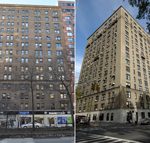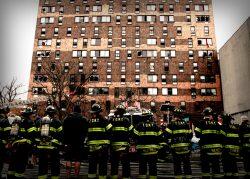A month ago, after a blaze killed 17 residents of a Bronx apartment building, survivors sued their landlord for allegedly ignoring fire safety issues.
Now, the city may be cracking down against other owners. It has brought a case against Jacob Weinreb, principal of the multifamily firm Weinreb Management and co-owner of 11 properties with over 200 building violations and nearly two dozen issued by the Fire Department.
The vast majority of the violations are for issues with the buildings’ facades, according to a lawsuit filed last week in Manhattan. The city has flagged the owner’s properties, which dot Manhattan, Brooklyn, the Bronx and Queens, for cracks in exterior walls, eroded joints and sidewalk sheds that aren’t up to code.
At many of those properties, Weinreb has also been cited for not keeping up the fire protection systems or not having them in the first place.
At 51 West 86th Street, for example, a pre-war building on the Upper West Side, the FDNY issued two violations for faulty sprinklers, missing fire extinguishers and malfunctioning alarm systems, the suit alleges.
A mile uptown, fire officials hit 777 West End Avenue with five infractions, alleging Weinreb couldn’t produce records of inspections and failed to equip his building with functioning extinguishers and fire hoses.
And the Department of Buildings flagged 3950 Blackstone Avenue, a two-building apartment complex in the Bronx, for rusty, eroded fire escape.
“For some of these violations, years have elapsed without the defendants establishing compliance as required,” the suit reads. Weinreb could not be reached for comment.
Read more


At 51 West 86th Street, the owner had put up scaffolding 15 years ago to fix the building’s hazardous facade, CBS reported. But in all that time, residents said, the repairs had not been done.
“These owners must address the hundreds of uncorrected violations from multiple city agencies putting the public and residents of these buildings at risk,” said Nicholas Paolucci, a spokesperson for the city’s Law Department. “No building owner is above the law.”
The issues at Weinreb’s buildings are not the same as those that plagued another owner’s Bronx building and contributed to the city’s worst fire tragedy in three decades. However, the litigation around Weinreb’s fire code violations could point to stricter city enforcement of fire hazards.
Jeremy House, a spokesperson for the city’s Department of Housing Preservation and Development, said the agency would be “doubling down on our efforts to educate building owners and all New Yorkers about critical fire prevention and safety.”
HPD regularly sends out bulletins to owners on how to comply with city housing codes. A January 2022 memo underscored the importance of maintaining self-closing doors in light of the deadly Bronx fire.
If history is any guide, landlords’ radar should be up. After a 2008 blaze at the abandoned Deutsche Bank building — a property riddled with fire code violations — killed two firefighters, the city went on to arrest 107 property owners who had failed to appear for hearings to address outstanding violations, Gothamist reported.
The City Council is working on a package of bills that would steepen fines for landlords who fail to maintain the self-closing doors required in their buildings, the Daily News reported.
And Mayor Eric Adams vowed to investigate the owners of the Bronx building that caught fire, the Daily News reported.
The mayor’s promise came after he told New Yorkers the message they should take from the tragedy is to “close the door,” a remark that critics said seemed to lay the blame with the building’s tenants. However, that is standard advice that applies to all doors, not just those required to be self-closing by city law.
This article has been updated to add comments from HPD.
